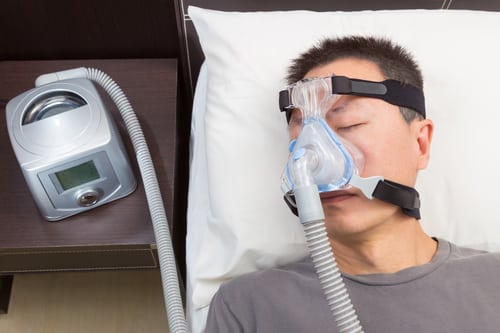Why Should You Seek Professional Diagnosis And Treatment For Sleep Apnea?

Sleep apnea is a common sleep disorder characterized by interrupted breathing during sleep. It can have serious implications for an individual’s health and quality of life. Seeking professional diagnosis and treatment for sleep apnea is crucial for several reasons.
Professional diagnosis ensures accurate assessment and identification of the condition, allowing for appropriate treatment planning. Ignoring sleep apnea can lead to various health risks, including cardiovascular problems, high blood pressure, and increased risk of accidents due to daytime sleepiness.
Professional treatment options for sleep apnea include continuous positive airway pressure (CPAP) therapy, oral appliances, and surgery, tailored to individual needs. Seeking professional treatment not only alleviates symptoms but also improves overall well-being and quality of sleep.
Additionally, lifestyle changes such as weight loss, regular exercise, and avoiding alcohol and sedatives can help manage sleep apnea. Lastly, there are numerous support groups and resources available to provide guidance and assistance to individuals with sleep apnea.
Key Takeaways
- Sleep apnea is a serious sleep disorder that can lead to various health risks if left untreated, including cardiovascular problems and high blood pressure.
- Professional diagnosis is crucial for accurate assessment and identification of sleep apnea, as it allows for a comprehensive evaluation of symptoms and severity.
- Professional treatment options, such as CPAP therapy, oral appliances, and surgery, can effectively manage sleep apnea and improve overall well-being.
- Seeking professional diagnosis and treatment for sleep apnea provides access to personalized care, guidance on lifestyle modifications, and ongoing support, which can help individuals better manage their condition and improve their quality of life.
Understanding Sleep Apnea
Sleep apnea is a complex disorder characterized by repetitive episodes of partial or complete obstruction of the upper airway during sleep. These obstructions lead to disruptions in breathing and can cause a range of symptoms, including loud snoring, daytime sleepiness, morning headaches, and difficulty concentrating.
It is important to seek professional diagnosis and treatment for sleep apnea due to the potential health risks associated with the condition. Untreated sleep apnea has been linked to a higher risk of developing cardiovascular diseases, such as hypertension, heart failure, and stroke. Additionally, it can lead to daytime fatigue, impaired cognitive function, and decreased quality of life.
Seeking professional help allows for accurate diagnosis through sleep studies and the implementation of appropriate treatment options, such as continuous positive airway pressure (CPAP) therapy, oral appliances, and lifestyle modifications. Early intervention can improve symptoms and reduce the risk of complications associated with sleep apnea.
The Importance of Professional Diagnosis
Accurate assessment of sleep apnea is crucial in order to determine the appropriate treatment plan for individuals. A professional diagnosis allows for a comprehensive evaluation of the symptoms, which helps in identifying underlying causes that may contribute to the condition.
Additionally, a professional diagnosis also aids in determining the severity of the sleep apnea, which is essential for tailoring the treatment approach.
Accurate Assessment of Sleep Apnea
Seeking professional diagnosis and treatment for sleep apnea ensures a comprehensive evaluation of the condition, providing a thorough understanding of its severity and potential health implications. Professional assessment allows for accurate identification of the type and frequency of apnea events, as well as the associated oxygen desaturation levels. This information is crucial in determining the appropriate treatment approach, such as continuous positive airway pressure (CPAP) therapy or oral appliances.
Moreover, professional diagnosis enables the identification of underlying causes or comorbidities that may contribute to sleep apnea, such as obesity or certain medical conditions. Additionally, a professional assessment can help identify potential complications of untreated sleep apnea, such as increased risk of cardiovascular diseases, stroke, and cognitive impairment.
By seeking professional diagnosis and treatment, individuals can receive personalized care and management strategies to improve their quality of life and overall health.
- Accurate identification of apnea events and oxygen desaturation levels.
- Determination of the most suitable treatment approach.
- Identification of underlying causes or comorbidities.
- Prevention of potential complications.
- Personalized care and management strategies.
Identifying Underlying Causes
Identifying the underlying causes of sleep apnea is essential in order to develop effective treatment strategies and minimize potential health risks.
There are various factors that can contribute to the development of sleep apnea, including obesity, anatomical abnormalities, and underlying medical conditions.
Obesity, particularly excess weight around the neck area, can lead to the narrowing of the airway, making it more difficult for air to flow freely during sleep.
Anatomical abnormalities, such as a deviated septum or enlarged tonsils, can also obstruct the airway and contribute to the occurrence of sleep apnea.
Additionally, underlying medical conditions like hypothyroidism or congestive heart failure can increase the risk of developing sleep apnea.
By identifying these underlying causes, healthcare professionals can tailor treatment plans to address these specific factors, improving the effectiveness of treatment and reducing the potential health risks associated with sleep apnea.
Determining the Severity of the Condition
Determining the severity of the condition plays a crucial role in developing appropriate treatment plans and minimizing potential health risks associated with sleep apnea. A professional diagnosis is necessary to accurately assess the severity of sleep apnea and guide treatment decisions.
Here are three reasons why seeking professional diagnosis and treatment is essential:
- Accurate assessment: A healthcare professional can conduct a sleep study to determine the frequency and severity of apnea episodes, as well as measure oxygen levels during sleep. This information helps in understanding the impact of sleep apnea on overall health.
- Tailored treatment: Professional diagnosis allows healthcare providers to customize treatment plans based on the severity of the condition. Mild cases may benefit from lifestyle changes, while moderate to severe cases may require continuous positive airway pressure (CPAP) therapy, oral appliances, or surgery.
- Minimizing health risks: Sleep apnea has been linked to various health complications, including high blood pressure, heart disease, stroke, and diabetes. Seeking professional diagnosis and treatment helps reduce these risks by addressing the underlying causes and managing the condition effectively.
Overall, professional diagnosis and treatment are crucial in determining the severity of sleep apnea and providing appropriate care to minimize potential health risks.
Potential Risks of Ignoring Sleep Apnea
Ignoring sleep apnea can have serious consequences for overall health, as it is associated with a range of chronic conditions. Research has shown that untreated sleep apnea increases the risk of developing conditions such as high blood pressure, heart disease, and diabetes.
Additionally, sleep apnea can have detrimental effects on mental health and cognitive function, leading to symptoms such as depression, anxiety, and impaired concentration.
Impact on Overall Health
The impact of untreated sleep apnea on overall health is significant and extends beyond just poor sleep quality. Sleep apnea is a serious medical condition that can have numerous detrimental effects on various aspects of a person’s health.
Here are three ways in which untreated sleep apnea can impact overall health:
- Cardiovascular problems: Sleep apnea is associated with an increased risk of hypertension, heart disease, and stroke. The repetitive pauses in breathing during sleep can lead to changes in blood pressure and oxygen levels, putting unnecessary strain on the cardiovascular system.
- Cognitive impairment: Sleep apnea has been linked to cognitive deficits, including difficulties with memory, attention, and executive functions. The constant interruptions in sleep can prevent the brain from getting the restorative sleep it needs, leading to cognitive impairment and decreased daytime functioning.
- Increased risk of accidents: The excessive daytime sleepiness caused by sleep apnea can significantly impair a person’s ability to concentrate and react quickly, leading to an increased risk of accidents, both on the road and in the workplace.
Overall, seeking professional diagnosis and treatment for sleep apnea is crucial to mitigate these health risks and improve overall well-being.
Increased Risk of Chronic Conditions
Untreated sleep apnea significantly increases the susceptibility to developing chronic conditions, evoking a sense of urgency to address this medical condition promptly.
Research has shown that individuals with untreated sleep apnea are at an increased risk of developing several chronic conditions. One such condition is cardiovascular disease, including hypertension, stroke, and coronary artery disease. Sleep apnea can lead to repeated episodes of oxygen deprivation, causing stress on the cardiovascular system and contributing to the development of these conditions.
Additionally, untreated sleep apnea is associated with an increased risk of metabolic disorders such as obesity and type 2 diabetes. The disrupted sleep patterns and hormonal imbalances caused by sleep apnea can negatively affect metabolism and insulin sensitivity.
Furthermore, untreated sleep apnea has been linked to an increased risk of mood disorders, cognitive impairment, and even an elevated risk of mortality.
Seeking professional diagnosis and treatment for sleep apnea is crucial in order to minimize the potential risk of developing these chronic conditions.
Effects on Mental Health and Cognitive Function
In addition to the increased risk of chronic conditions, sleep apnea can also have detrimental effects on mental health and cognitive function. Numerous studies have shown a strong association between sleep apnea and the development of mental health disorders such as depression, anxiety, and mood disturbances.
The intermittent oxygen deprivation and sleep disruptions caused by sleep apnea can lead to alterations in brain structure and function, resulting in cognitive impairment. Individuals with untreated sleep apnea often experience difficulties with attention, concentration, memory, and executive functions. These cognitive deficits can significantly impact daily functioning, work performance, and overall quality of life.
Seeking professional diagnosis and treatment for sleep apnea is crucial in order to prevent and manage these mental health and cognitive consequences, allowing individuals to regain optimal mental well-being and cognitive abilities.
Treatment Options for Sleep Apnea
Treatment options for sleep apnea include continuous positive airway pressure (CPAP) machines, oral appliances, and surgical interventions.
CPAP machines are the most common and effective treatment for sleep apnea. They work by delivering a constant flow of air pressure through a mask, which helps to keep the airway open during sleep.
Oral appliances are another option, which are custom-made devices that help to reposition the jaw and tongue to keep the airway open.
Surgical interventions may be recommended for severe cases of sleep apnea that do not respond to other treatments. These can include procedures such as uvulopalatopharyngoplasty (UPPP) or jaw advancement surgery, which aim to remove excess tissue or reposition the jaw to improve airflow.
It is important to consult with a healthcare professional to determine the most appropriate treatment option based on individual needs and severity of sleep apnea symptoms.
Benefits of Seeking Professional Treatment
One compelling reason to consider seeking professional help for sleep apnea is the potential for improved overall health and well-being. Professional diagnosis and treatment can provide individuals with access to a range of effective interventions that can alleviate the symptoms and complications associated with sleep apnea. These interventions may include continuous positive airway pressure (CPAP) therapy, oral appliances, positional therapy, and in some cases, surgery. Seeking professional treatment ensures that individuals receive personalized care based on their specific needs, as healthcare professionals can tailor the treatment plan to address the severity and underlying causes of sleep apnea. Moreover, professional treatment can help individuals better understand their condition, learn about lifestyle modifications that can improve sleep quality, and receive ongoing support to manage the condition effectively. By seeking professional help, individuals can significantly improve their quality of life and reduce the risks associated with untreated sleep apnea.
| Benefits of Seeking Professional Treatment | ||
|---|---|---|
| Access to a range of effective interventions | ||
| Personalized care based on individual needs | ||
| Improved understanding of the condition | ||
| Guidance on lifestyle modifications | ||
| Ongoing support for managing sleep apnea | Improved quality of life and overall health. |
Lifestyle Changes to Manage Sleep Apnea
Lifestyle changes can play a crucial role in managing sleep apnea and improving overall sleep quality and health. Making certain adjustments to daily habits can help alleviate the symptoms of sleep apnea and reduce the severity of the condition.
One important lifestyle change is maintaining a healthy weight through regular exercise and a balanced diet. Obesity is a significant risk factor for sleep apnea, and losing excess weight can greatly improve symptoms.
Avoiding alcohol and sedatives, especially before bedtime, is also recommended, as these substances can relax the muscles in the throat and exacerbate sleep apnea.
Additionally, sleeping on the side instead of the back can help keep the airway open and reduce the frequency of breathing interruptions.
Lastly, establishing a regular sleep schedule and practicing good sleep hygiene can contribute to better sleep patterns and overall well-being.
By implementing these lifestyle changes, individuals with sleep apnea can better manage their condition and enhance their quality of life.
Support and Resources for Sleep Apnea
Support and resources are available to individuals with sleep apnea to help them navigate their condition and improve their quality of life. These resources can provide valuable information, guidance, and assistance to those seeking help for sleep apnea.
- Support groups: Joining a support group can provide a sense of community and understanding. It allows individuals to connect with others who are going through similar experiences, share advice, and find emotional support.
- Educational materials: Various educational materials, such as brochures, websites, and online forums, offer comprehensive information about sleep apnea. They provide knowledge about the condition, its symptoms, treatment options, and coping strategies.
- Healthcare professionals: Seeking professional help is crucial for managing sleep apnea effectively. Healthcare professionals, such as sleep specialists or pulmonologists, have the expertise to diagnose and treat sleep apnea. They can provide personalized treatment plans and monitor progress.
- Technology and devices: Continuous Positive Airway Pressure (CPAP) machines, oral appliances, and other technological advancements can significantly improve sleep apnea symptoms. These devices can help individuals breathe more easily during sleep and reduce the risk of complications.
By utilizing these support and resources, individuals with sleep apnea can develop effective strategies to manage their condition, enhance their quality of life, and find the necessary support along their journey.
Frequently Asked Questions
What are the common symptoms of sleep apnea?
Common symptoms of sleep apnea include loud snoring, excessive daytime sleepiness, morning headaches, difficulty concentrating, irritability, and frequent awakenings during the night. Seeking professional diagnosis and treatment is important to prevent potential complications and improve overall quality of life.
Can sleep apnea be cured without professional treatment?
Sleep apnea cannot be cured without professional treatment. It is a serious medical condition that requires intervention from healthcare professionals. Seeking professional diagnosis and treatment is crucial for managing the symptoms and improving overall quality of life.
Are there any alternative treatments for sleep apnea?
Alternative treatments for sleep apnea include lifestyle changes such as weight loss, avoiding alcohol and sedatives, positional therapy, and the use of oral devices. However, professional diagnosis and treatment is recommended for effective management of the condition.
How can I find a sleep specialist or professional in my area?
To find a sleep specialist or professional in your area, you can start by asking for recommendations from your primary care physician or contacting sleep disorder centers or clinics affiliated with reputable medical institutions in your locality.
What are the long-term consequences of untreated sleep apnea?
Untreated sleep apnea can lead to serious long-term consequences. These may include an increased risk of developing high blood pressure, heart disease, stroke, diabetes, obesity, and mental health disorders such as depression and anxiety. Seeking professional diagnosis and treatment is crucial to mitigate these risks.










